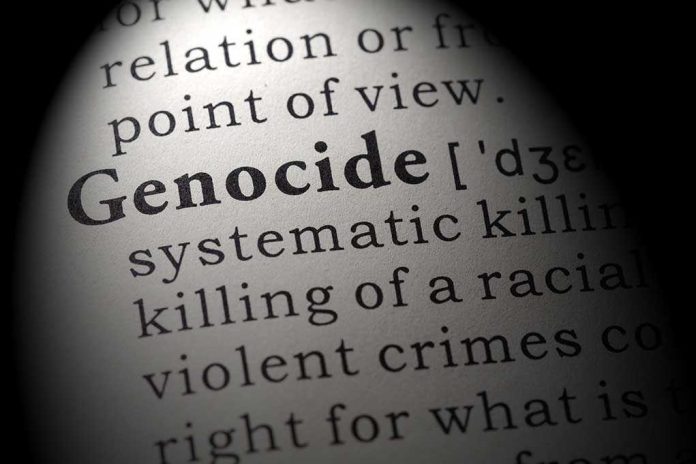
While the world obsesses over conflicts making headlines, one of the deadliest genocides of our time unfolds in Sudan’s streets as civilians face systematic slaughter by warring military factions.
Story Overview
- Over 3,384 civilians killed in first half of 2025 alone as Sudan’s civil war intensifies
- Rapid Support Forces capture El Fasher after 500-day siege, triggering mass atrocities
- Both military factions accused of war crimes including executions and ethnic cleansing
- International community’s response labeled a complete failure by UN officials
- 8.8 million people displaced in what experts call potential genocide
Urban Warfare Turns Streets Into Killing Fields
Sudan’s capital Khartoum has become a battleground where civilians cannot escape the crossfire between the Sudanese Armed Forces and the paramilitary Rapid Support Forces. Since April 2023, both factions have engaged in unprecedented urban warfare, turning residential neighborhoods into death traps. Indiscriminate shelling, airstrikes, and street-level executions have become daily realities for millions trapped in cities.
The violence escalated dramatically in October 2024, marking the deadliest month for civilians when RSF forces massacred at least 300 people in Gezira State. These weren’t collateral casualties of military operations but systematic targeting of non-combatants, including women, children, and elderly residents who posed no military threat to either side.
El Fasher Falls After Marathon Siege
The strategic city of El Fasher endured a brutal 500-day siege before finally falling to RSF forces in October 2025. This wasn’t merely a military victory but a humanitarian catastrophe that triggered mass displacement and fresh waves of atrocities. UN officials described the international community’s failure to prevent this outcome as emblematic of global indifference to Sudanese suffering.
Residents who survived the siege describe scenes of unimaginable horror. Bodies littered streets for days, basic services collapsed entirely, and those attempting to flee faced execution or sexual violence. The fall of El Fasher represents more than territorial control; it demonstrates how modern conflicts can devastate civilian populations while the world watches passively.
Systematic Atrocities Target Ethnic Groups
This conflict extends far beyond a power struggle between military leaders. The RSF, evolved from the notorious Janjaweed militia responsible for the Darfur genocide, has systematically targeted specific ethnic communities. Human Rights Watch and Genocide Watch have documented patterns of violence that constitute potential genocide and crimes against humanity.
Sexual violence has become a weapon of war, with both factions implicated but RSF forces particularly brutal in their treatment of women and girls. These aren’t random acts of violence but calculated strategies designed to terrorize communities and destroy social fabric. The systematic nature of these atrocities suggests coordination at the highest levels of command.
International Response Falls Short of Crisis Scale
The global response to Sudan’s crisis reveals the stark limitations of international humanitarian systems when faced with determined military actors. Despite overwhelming evidence of war crimes, neither sanctions nor diplomatic pressure have meaningfully constrained either faction. Humanitarian organizations struggle with severely restricted access while funding falls catastrophically short of needs.
This failure reflects broader problems with how the international community addresses conflicts in strategically unimportant regions. Sudan lacks the geopolitical significance that drives major power intervention, leaving its people to face genocide with minimal external support. The contrast with international responses to other conflicts exposes uncomfortable truths about global priorities and the selective application of humanitarian principles.
Sources:
Sudanese civil war (2023–present) – Wikipedia
Sudan Genocide Emergency September 2025 – Genocide Watch
Sudan Timeline January-March 2025 – Dabanga Sudan
Sudan – Human Rights Watch World Report 2025
Power Struggle in Sudan – Council on Foreign Relations

